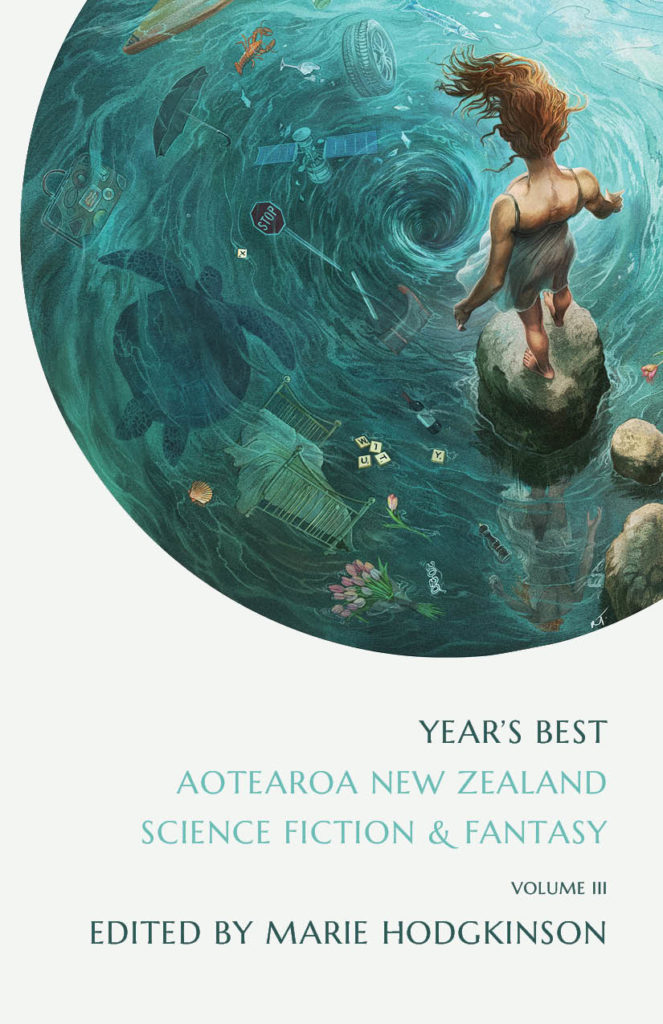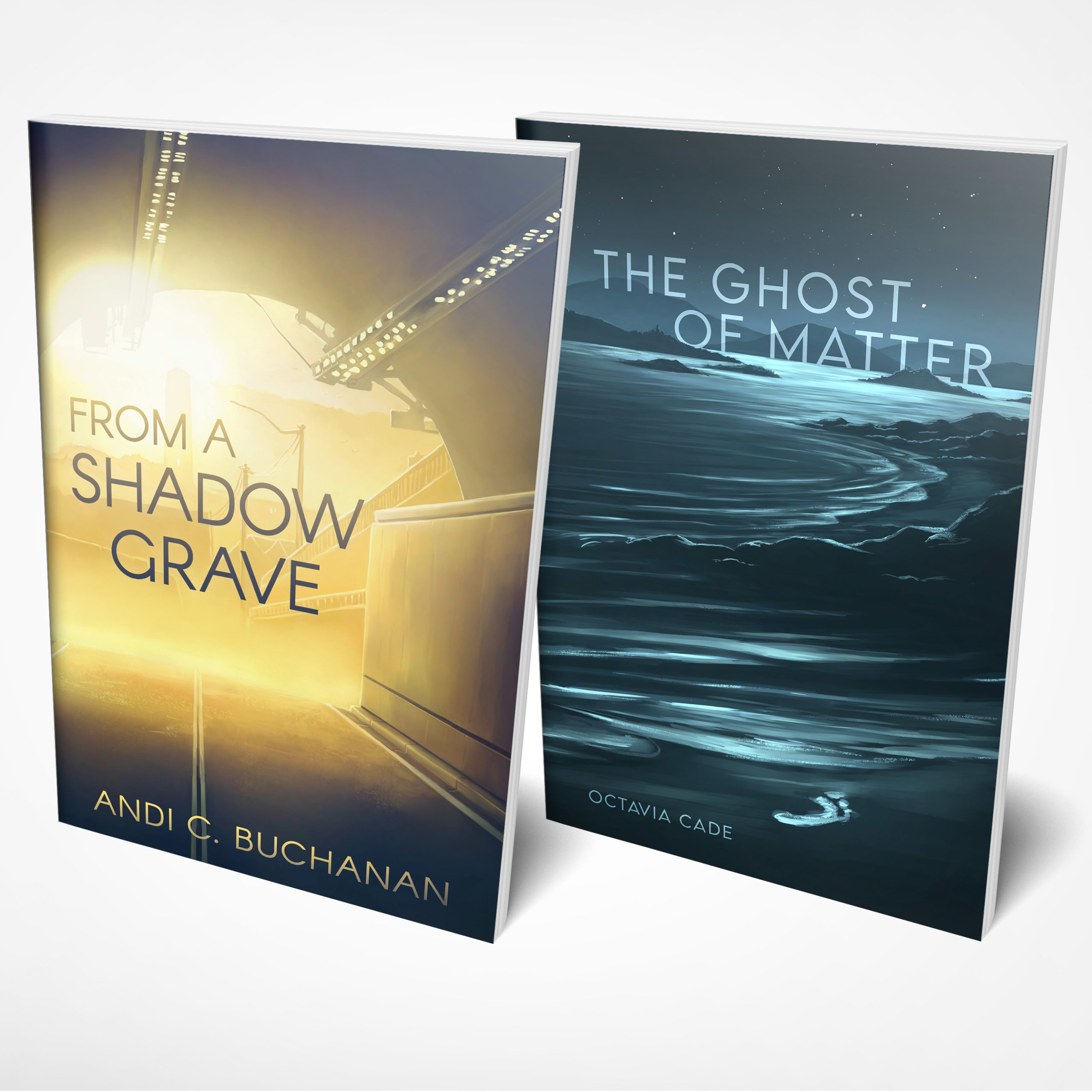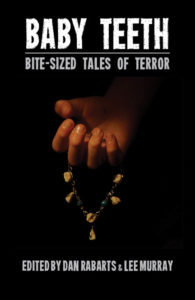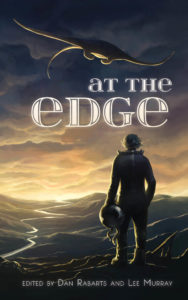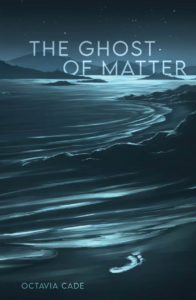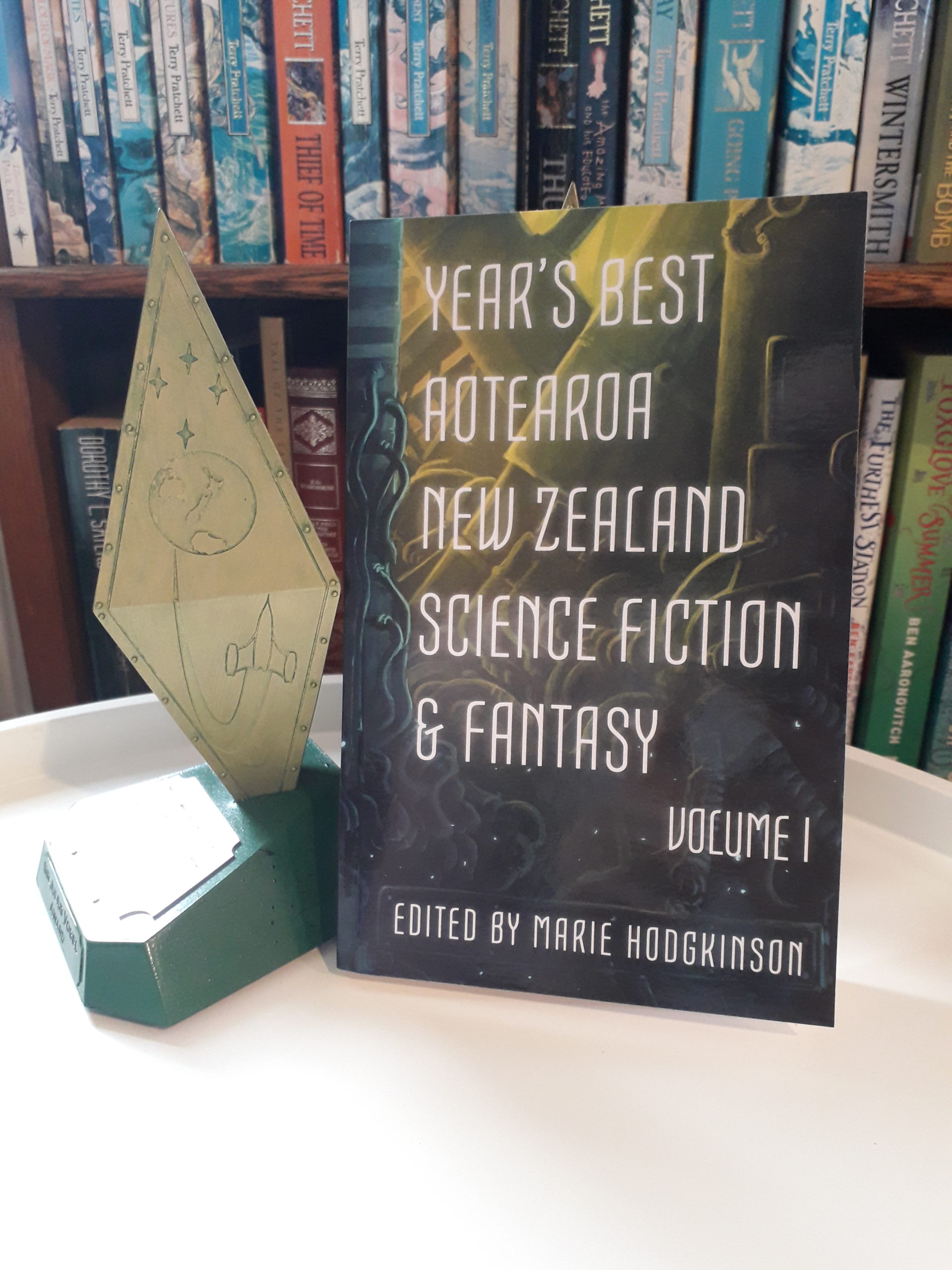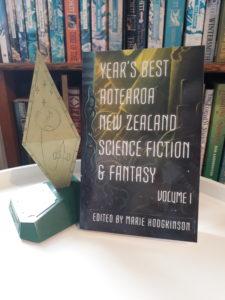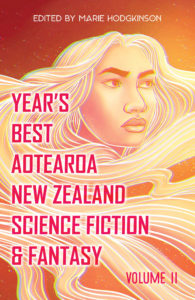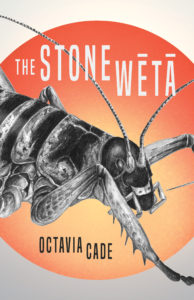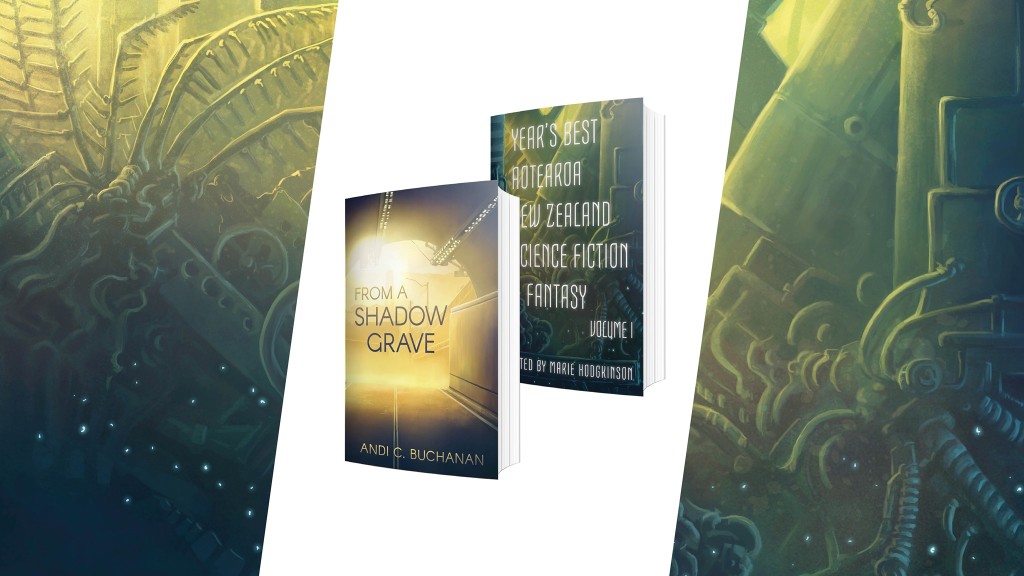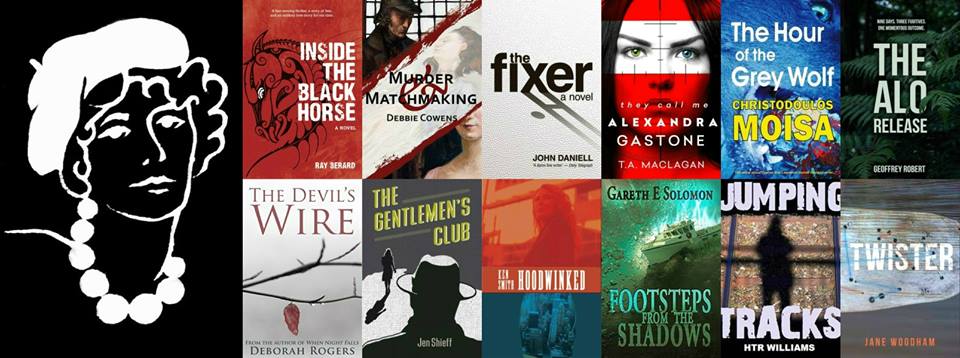From a Shadow Grave, bu Andi C. Buchanan, is the story of Phyllis Symons and Aroha Brooke, and the ways their lives and deaths overlap as time splinters into different threads. Phyllis dies, is saved, and saves herself – and Aroha always finds her, or is found, herself, by the woman her own story twines itself around.
The searchers find your hand first, where you had almost but not quite broken the surface in your desperation. There’s a cry, and then others arrive with shovels.
It’s a strange thing to watch your own body dug up from beneath the soil. You don’t understand what’s happening at first, whether you’re alive or dead, whether you’re above ground or below. You want to yell at them that you’re here, not there, but you also want to hide from all of them, very quiet and very small. Your face looks pale beneath the soil, and your hair is muddy and matted. It’s a terrible thought, but you can’t help wondering if anyone could ever call you beautiful now.
*
You are no longer whole. You have been broken in two; victim and villain, vulnerable child and wild young woman. You are tethered to this hill, and yet you are being taken into town for examination. Cold hands and instruments and peering eyes and verdicts, until finally, you are being taken up to Karori and buried properly in a corner of the cemetery among the drifting petals of old roses.
You’re too far away from Karori. Like most ghosts, you’re tied to the location of your death, cursed to keep reliving it. Your spirit is on one hill, and your body lies deep within another. Your mother visits the Karori Cemetery every Sunday after church for a year, but she never visits Mount Victoria. She visits your body, but she never visits you.
You try, sometimes, to visit her, to move from this place, but you always end up moving in a circle. There’s nothing solid to hold you, but at the same time escape is impossible. It is a lingering pain, the final insult, an endless cage. Sometimes you’ve longed for death, real death, and you’ve thought, couldn’t he just have killed me properly?
But perhaps it is also a resistance, the last piece of you refusing to die, clinging on out of stubbornness, out of spite. Clinging on even as George is tried and hanged at Mount Crawford Jail, and after, on through the decades.
You haunt this hillside through the lingering Depression, and into another war. The tunnel opens, and the sound of picks against rock is replaced by endless motors. You haunt the hillside as the troop ships leave and return emptier, or don’t return at all. Fortifications are built on other hills for an invasion that never comes.
You feel the shudders of every earthquake, and wonder each time if the earth has finally come to swallow you up. You wish for a peaceful grave but are strangely relieved each time to find yourself still able to rise above the soil and rock and mud. You watch out over the harbour after the war, as the lights and the city grow, and you cannot grow at all.
*
You don’t remember when you first realised that the noise of car horns through the tunnel was directed at you. At first, you thought they were sounds of greeting or of anger, anger at each other as the roads packed ever tighter with cars.
You realise now, that it is you they are scared of.
You weren’t good, in the early days, at controlling your visibility. You’re not sure, even now, how you do it, but with enough practice it comes to you as naturally as speaking or swallowing once did. In the early days you were seen floating around the tunnel, semi-translucent in your old dress, and was your hair brushed neatly, or tangled and bloodied? You’re not sure.
You’d like to take their fear of you as power, to rise above it all. To know that they all fear you now, those who once looked down on you, the rich people and important people, the clever people, and they can do nothing to harm you. But you cannot. The car horns do not scare you away, as they like to think, but they make you feel forlorn, rejected, and despised in death as well as in life.
You are, after all, still only seventeen.
Over the decades, you watch buildings being constructed and demolished, the city rising and the cars changing, the girls heading up to school, how the fashions evolve each year. You can see only part of the city, tethered to this hillside as you are, but you know it has changed, that so many of the places where you spent your time are gone.
Every year, there are fewer and fewer people who remember you at all.
*
People will say that you are just a ghost story. They remember you only as a haunt, a presence that unnerves them, unnatural and perhaps malevolent. Something that needs to be sent away. You’re a memory of memories they’d rather forget.
They name you not with your name, but with the site of your murder. They don’t remember any of your other stories. To them, you will never be a lonely, angry, confused teenager, who liked to go to the movies and hoped she was in love, who fought with her siblings and always had a tune in her head. You’re a ghost story, and all other stories of you have been told and ended.
You deserve more stories than you get.
*
In this story you do not remain alone. In this story it’s eighty years later and Aroha Brooke has just arrived in Wellington, having loaded two cases of books, clothes and weapons onto the InterCity at Feilding and not looked back.
Aroha Brooke has black hair, heavy like inked lines, and year-round freckles scattering her face. She wears a black leather jacket, with knives in the inner pocket and more in the belt that runs through her jeans.
She finds a room in a rundown villa on Ellice Street and enrols to study law and sociology at Victoria, but that’s not why she’s really here. She doesn’t come to find you for almost a year, because she has other things to deal with, but there comes a time when you’re the only one who can help her.
Aroha Brooke isn’t scared of you. Anyone who considers themselves haunted by a girl who is always seventeen and just wanted to go to dances with her friends and listen to the radio and have children she could take out on the trolley to the beach at Island Bay, has led a charmed life as far as Aroha Brooke is concerned. She knows about real hauntings; you can see it in her eyes. And perhaps that’s why you can talk to her.
She finds you the old-fashioned way, by marching up the hill one night and calling your name. No-one’s ever done that before. There has been the odd ghost hunter – either drunk young men or middle-aged cranks with all kinds of equipment, but they’re interested in detecting changes in temperature or distributions of infra-red light, rather than talking to you. No-one’s called your name like they want to speak to you, like you were a person. Not until Aroha does. And so, you answer.
You expect your voice to be hoarse from lack of use after all these years, but you sound like you always did.
“Yes,” you say. “I’m here.”
“Good,” she says, like ghosts respond to her every day. “Can I see you?”
No human has seen you since 1932 – they made it clear you weren’t welcome, with all their screaming and waving of spades, and they’ve continued to tell you that you aren’t welcome ever since, palms pressed hard on their car horns, rhythms of determination as they speed through the tunnel. But you still show yourself sometimes to the birds and to the night air, just to prove to yourself that you can.
Still, it’s been a couple of years since you even did that, and you’re pleased to see you show little sign of your old injuries, at least as far as you can tell. Your smocked dress is crumpled and a little muddy and you’re bruised right through, but as long as you don’t turn your back to Aroha you look acceptable. You try to run your hands through your bobbed hair, to tease out the mud-matted knots, but your hair is air, your hands are air.
If losing your life and yet still being here makes any sense, if there is a way to understand being dead and yet not being dead, it is in this: you had some power over yourself, to decide on your own body – how it moved, where it went. To brush your hair and change your clothes. To dance or to sit still, to sing or to listen. He took your life from you; not your existence, but your choice to do all those things and more.
You still have some choices though, and you make one of them now. You walk forwards out of, or more accurately through, the gorse bushes and stand or hover or whatever it is you do now in front of her.
“Hi,” she says. “Thank you.” Then she pauses. “You’re Phyllis Avis Symons?”
You savour the syllables of a name barely spoken in decades, and smile in spite of yourself.
“That’s me,” you say.
“Aroha Brooke,” she says. “Pleased to meet you, Phyllis.”
She sits, more comfortably than you’d expect, on a stone ledge, not worrying about the dampness from the days of horizontal rain.
“How do you know about me?” you ask.
“You might not believe me,” she replies.
“I’m a ghost. I’ll believe most things.”
‘‘I deal with supernatural things, I guess. Ghosts, and all the others. Patupaiarehe, demons, shifters, werewolves, taniwha. Even had a dokkaebi someone had managed to import. That was … interesting. I could always see things other people couldn’t, but when my grandmother died, that’s when I started taking it seriously. Doing research. Taking responsibility for keeping people safe – wide definition of people there.”
You don’t recognise half the words she says, but it’s no surprise to you that there are other things out there that are neither human nor animal, not quite of this world. You haven’t come across them, because you’ve been tied to this hillside and they’ve had no reason to come to you, but you’ve always assumed there were other ghosts out there, and if there are ghosts, there could be anything.
“So you have a responsibility to meet all the … all the … people … like me?” you ask, unsure of your words. You have not spoken to another in so long.
Aroha laughs. It’s a deep, hearty laugh, with no unkindness.
“Nope. I’m not a fucking networker or ambassador or whatever the fuck. I mean, it’s nice to meet you and all, and you seem lovely, but I have way too much to deal with without going out to find anyone I don’t have to. Believe me, if I had my way, I’d be spending my evenings alone with ice-cream and Netflix.”
You look at her blankly.
“I’ll explain Netflix to you some other time. You’ll love it. Anyway, this is a difficult case I’m on and I’m sorry it’s going to bring back some bad memories and shit, but if I don’t, people will die, so I’m going to ask for your help anyway.”
You laugh bitterly.
“I’m a ghost with a huge head wound. I don’t get that far away from my bad memories at the best of times.”
Aroha nods, and there’s an understanding between the two of you.
“The thing is,” Aroha says, “usually when there’s trouble it’s either someone being ignorant or someone fucking around. There are heaps of pranksters and tricksters in every culture, and sometimes they just need a firm word and a show of strength. Or it’s like … Pākehā complaining about a taniwha hanging out by their nice new river-view homes. And anyone with any sense interprets a taniwha as a warning not to build in a certain place because come the next earthquake or tsunami, you’re fucked. And yet, they act like the taniwha is the problem.
“There’s a lot of talking, a bit of posturing. Not as much danger as you’d think, though I’ve had my moments. But believe me, the worst people in my life, the biggest dangers, have been solidly human.” She pauses. “I don’t know why I’m telling you this stuff.”
“Because you need my help? And because you don’t have many people to tell it to?”
Aroha tosses her hair in the sort of dismissal that makes it clear you’ve hit the mark. “Yes, I need your help.”
“Do you want me to stop haunting or something? Because I don’t have that much choice in the matter. Practically no-one’s seen me in decades. And I know people get scared but I’m actually quite harmless.”
“Oh no. It’s not you that’s the problem. I mean, it relates to you, a bit. But I don’t want you to stop doing anything, just help me deal with something.”
You swallow, still uncertain what is happening.
“How can I help?”
Aroha laughs. “You’re meant to ask what’s in it for you. At least, that’s what I’m used to.”
You feel vaguely ashamed, as if you’ve missed out on learning an obvious social convention. “Is there something you can do for me?”
“I can free you from this place. Break the ties that hold you here. You can go through the whole city at will. Do what you want.”
You’ve been trying for a long time not to let yourself feel any hope for anything, but when you hear this, your heart soars. You know you can never get your life back, but to escape from this cold and unforgiving hillside, from the site of what had been done to you, is the best thing you could hope for.
You don’t let these feelings show. If she thinks you want it too much she can change the terms, demand more from you.
“How?” you ask.
“It’s an issue with body magnetism and directional positioning. Well. Not body, I guess. Birds always know where to fly when the seasons change because they’ve got some magnetic sensor in their heads. It’s similar with ghosts. You’re always pulled in one direction. It’s not strictly magnets, but it works the same way. When you died and became a ghost, something changed in the place where you died and it’s charged and pulling you back to it. I need to remove the sense of you from the soil or rock or wherever you’re tied to, and then you can move wherever you want.”
“And I just have to help you?” You try to hide the scepticism in your voice, but you struggle to believe this is all she’s asking for. “How long will it take to deal with that problem of yours?”
She shrugs. “How long is a piece of string?”
“I’m not agreeing to that. Not when there’s no escape for me. I’ll help you for a year, and then if we haven’t sorted it, I’m free to go.”
“Works for me. If it takes that long we’re all fucked anyway. I’m not trying to keep you captive though, I’m not into that shit. This is an exchange of services, that’s all. Deal?”
“Deal.”
*
Aroha breaks the bonds that hold you; she sets you free.
The whole hillside lights up around you and her, lines glowing like trails of stars, like neon crossing the darkness. You follow the intangible wires with Aroha close behind you, and when you see where they are leading, you stop. Memories overwhelm you. You’re not sure if it’s crying, when there are no tears, and you’re not sure if it’s nausea when it’s impossible for you to vomit, but it’s definitely something, and you find it harder and harder to move.
“Almost there,” Aroha says, like the cause of your slowing is something simple like a twisted ankle or a sleepless night, and that makes you want to laugh, and that distracts you enough to keep going. All the lines lead to one point, a patch of soil that is shining brighter than any other. You swallow.
That soil must have been turned and turned again, trampled upon, grass mown and regrown. Underneath, your blood that once soaked it is now indistinguishable from the mud. No-one looking at it would notice anything different, no-one would know that the last of your life force seeped out there.
You know.
“What are you going to do?” you ask. “Burn it?”
Aroha laughs. “Ohhhh no. Not unless you want to be a fiery terror flying around the city at night. Been there, done that, got the second-degree burn scars on my arm that will be with me for life.”
Once you dreamed of being something like that, unholy and vengeful, screaming around the city striking fear, wreaking retribution on every man like George, every man who misled young women and, worse than merely striking them, made them believe it was their own fault when they were struck.
There’s still a glimmer of appeal in it. But all you say is: “Right. Bad idea then.”
“If we scatter it widely enough it loses its strength. Sometimes it happens naturally. There are ghosts in this world far from where they ever lived. Though mostly even when they’re free, they stay put. Habit, I guess. Or not knowing they can move.”
Aroha grabs a handful of the glowing soil and throws it towards the city. Another on the path below, and then she moves quickly, picking up handfuls and throwing them in all directions, spinning, nearly dancing, laughing as she goes.
The light shatters. The soil loses most of its glow as it hits the ground, dispersed amid the grass and on the paths below. You float upwards and you keep floating over the hill, down the pathways and through the streets that are not the same as you left them but not impossibly different either. The Kings is gone but the Paramount and the Embassy are still there; you find traces of the past, traces of the world you were snatched from. You keep going and you are free.
The world splinters into shards of new stories for you to find.
Read on by purchasing From a Shadow Grave in paperback from our website (New Zealand only) or in ebook or paperback from any of these stores!
